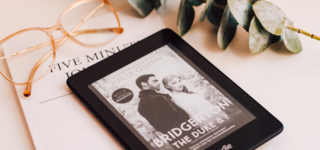Fantasies
Why Many People Find Historical Romance to Be So Sexy
... and why certain groups find them especially appealing.
Posted October 21, 2022 Reviewed by Tyler Woods
Key points
- More than one-third of adults report having fantasies about sex in historical settings.
- Fantasizing about sex in varied settings (past, present, and future) is a handy way of meeting our need for novelty.
- Many people romanticize the courtship practices of the past, which stand in stark contrast to modern, online dating.
- Historical sex fantasies are linked to having more fantasies about virginity themes.

Bridgerton, Outlander, Harlots, and The Tudors are just a few of the many popular period dramas that have gotten people hot and bothered in recent years. Yes, there is a lot of sex in general on television today, but sex scenes set long ago in the past seem to be increasingly common—and in demand. Indeed, Bridgerton's steamy sex scenes in its debut season helped it to become one of the most-watched series of all time on Netflix.
People seem to be horny for historical sex. Why?
Historical Sex Is a Popular Theme in Our Sexual Fantasies
Part of the reason steamy period dramas have such wide appeal is that a lot of people fantasize about historical sex in general. In a survey of 4,175 Americans’ sexual fantasies I conducted for my book Tell Me What You Want, one of the many things I asked people about was whether they had ever fantasized about having sex in a historical setting. Here’s what I found:
- Overall, 34 percent of adults said this was something they had fantasized about before.
- 29 percent of heterosexual women and 30 percent of heterosexual men reported having had the fantasy, which indicates that—at least among heterosexual folks—there isn’t really a gender difference, which may surprise some of you.
- By contrast, 40 percent of lesbian and bisexual women reported having had the fantasy, compared to 33 percent of gay and bisexual men. So there is a bit of a gender difference when looking at sexual minorities—but, overall, sexual minorities are more likely to fantasize about historical sex than are heterosexual persons.
- 42 percent of non-binary and trans persons reported having had this fantasy, which also suggests that these fantasies are more common among gender-diverse adults than they are among their cisgender counterparts.
Why Historical Sex Turns Us On
So, historical sex is not an uncommon fantasy theme. But why are so many people drawn to it in the first place? My data suggest a few possibilities.
I found that historical sex fantasies were most common among people who had active imaginations in general, as well as those who were high on the personality trait of openness to experience. This suggests that these fantasies may sometimes simply be the product of either a wandering mind or just being curious about having many different sexual experiences. In other words, for some, there isn’t necessarily a deeper psychological meaning because some people just fantasize more about almost everything.
Historical sex fantasies are also more common among those who fantasize about sex in exotic places in general, such as having sex on a beach or in nature. However, these fantasies are especially common among those who fantasize about sex in rather fantastical locations, such as in outer space or in a science-fiction setting.
To me, this suggests that these fantasies may be, in part, about meeting our need for novelty. We know that people grow bored easily with sexual routines and need to keep introducing new elements into their sex lives to maintain arousal and desire. So it may be that visualizing sex in a different setting (past, present, or fictional) is just a handy way of introducing some sexual newness and, thereby, boosting arousal.
Romanticizing the Past
In addition, fantasies about sex in historical settings are linked to having more fantasies about passion and romance in general. In other words, people who tend to feature more intimate and romantic elements in their fantasies overall seem especially likely to have fantasized about sex in a historical location. This suggests that, for some, the root of these fantasies may simply be about creating a romantic aura that evokes both sexual arousal and intimate feelings.
It’s easy to see how some people in the modern world might romanticize the courtship practices of the past. For instance, courtship today (especially in online settings) often features nothing more than a brief message saying “hello” or “what’s up?” And, in some cases, it includes an unsolicited nude photo (which is often unwanted, especially amongst female recipients). This doesn’t feel very romantic to a lot of people, so fantasizing about someone courting you who truly needs to demonstrate their love and commitment and does so in a respectful way could seem quite appealing in contrast.
Finally, I also found that people who fantasized about historical sex had more fantasies featuring virginity themes, such as being a virgin again and having one’s very first sexual experience. Virginity is a popular theme in media depictions of historical sex (including in Bridgerton), so it may be that people who fetishize virginity or those who wish that they had a better first time may be particularly drawn to historical sex.
Of course, there are other possible reasons people might be drawn to fantasies about or depictions of historical sex—and different people may be drawn to this for very different reasons. As with any fantasy, there’s never just one thing that makes it appealing to everyone.
Facebook image: Darya Komarova/Shutterstock
References
Lehmiller, J. J. (2018). Tell me what you want: The science of sexual desire and how it can help you improve your sex life. Hachette.




